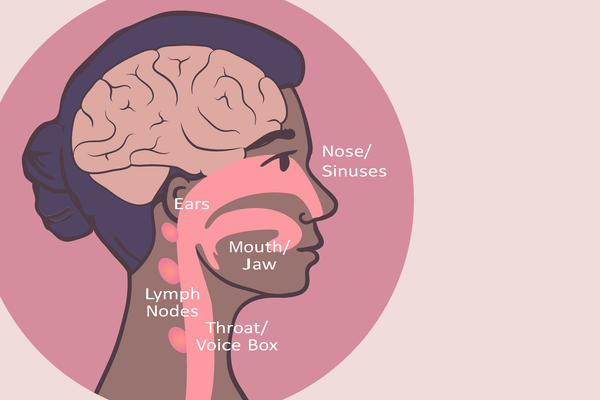The most common cancers in the United States include breast, lung, colorectal and skin (melanoma). However, less common cancers can be just as serious. Head and neck cancers, for example, account for nearly 4% of all cancers in the United States and affect tens of thousands of people worldwide.
Head and neck cancer refers to a group of cancers that start in the sinuses, nose, mouth, throat, larynx, lips and salivary glands. Tobacco use, alcohol consumption and human papillomavirus (HPV) are among the main risk factors for head and neck cancers.
It’s also significantly more common in men than women and in Black people than white people. When caught early, many head and neck cancers are curable, but sometimes you can prevent them in the first place.
Here are 7 ways to help reduce your risk of head and neck cancers.
1. Don’t Smoke or Use Tobacco Products
Using tobacco products, such as cigarettes and chewing tobacco, can significantly increase your risk for head and neck cancers. In fact, smoking and using tobacco is the largest risk factor for this group of cancers. Up to 80% of head and neck cancers are linked to tobacco use. Not only should you stop smoking if you do, you should stop use of all tobacco products, including cigars, pipes and snuffs.
People with a history of head and neck cancer should also avoid exposure to secondhand smoke during remission. Some research suggests that secondhand smoke can affect their recurrence and survival rate.
2. Limit Your Use of Alcohol
Like tobacco, alcohol can cause cancer, and it’s a known risk factor for head and neck cancers. It’s also a major risk factor for recurrence in survivors.
The risk increases the more you drink, so it’s possible to lower your risk by quitting or drinking in moderation. That’s up to one alcoholic drink per day for women.
3. Get the HPV Vaccine
HPV is a common viral infection. It’s also a risk factor for various cancers, including head and neck cancers that start in the back of the throat.
HPV vaccines can prevent oral HPV infections, which could reduce certain head and neck cancers, such as throat and back of mouth cancers. Since HPV is one of the three major risk factors for head and neck cancers — along with tobacco and alcohol use — asking a healthcare professional about vaccination against HPV could lower your risk.
Watch: How to Talk to Your Healthcare Provider About Getting HPV Vaccine as an Adult >>
4. Practice Proper Sun Protection
Some cancers that occur on the head and neck start on the lips. So too much exposure to ultraviolet (UV) radiation could increase the risk of developing lip cancers on the head and neck. Some strategies to lower the risk of head and neck cancers include applying sunscreen to the lips, wearing wide-brimmed hats and avoiding tanning beds.
5. Lower Exposure to Toxins in Occupational Settings
There’s a link between head and neck cancers and certain occupations. Cooks, cleaners and painters may be at higher risk because of toxins in their workspaces. However, taking certain precautions, such as employing the proper personal protective equipment (PPE), could help lower the risks. If you have concerns about your risk of exposure at work, talk to your supervisor or HR representative. If you don’t feel like you’re being heard, consider filing a complaint with OSHA.
6. Schedule Annual Dental Visits for Routine Exams
Since some head and neck cancers begin in the mouth, it’s important to practice proper oral care. This includes at-home care, such as brushing your teeth and flossing, as well as routine dental visits. There aren’t routine screening tests for head and neck cancers, but your dentist may look for cancerous lesions in the mouth during routine exams.
It’s generally recommended to schedule a dental check-up once or twice a year. These visits may be covered by your private healthcare plan, but dental insurance isn’t covered on all plans offered under the Affordable Care Act (ACA). You may be able to find free or low-cost dental services near you. Mobile dental clinics are sometimes also a resource for underserved areas.
7. Ask a Healthcare Professional About Screening
Early detection of head and neck cancer could increase your survival rate, but there aren’t official guidelines for routine screenings. More research is currently being done to determine if screenings prevent head and neck cancer deaths.
For now, you should assess your risk for head and neck cancers. If you’re at risk, ask your healthcare provider how you can get screened.
This educational resource was created with support from Merck.
- Fast Facts: What You Need to Know About Head and Neck Cancer ›
- Symptoms of Head and Neck Cancer ›
- Clinically Speaking: Questions to Ask Your Healthcare Provider About Head and Neck Cancer ›
- A Rare Head and Neck Cancer Taught Me How to Be My Best Advocate ›
- Ask the Expert: Head and Neck Cancer ›
- Coping With the Emotional Impact of Head and Neck Cancer ›
- Ubicaciones del cáncer de cabeza y cuello - HealthyWomen ›
- Locations of Head and Neck Cancer - HealthyWomen ›
- What Is the Link Between HPV & Head and Neck Cancers? - HealthyWomen ›






